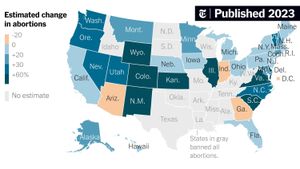Trade relations between the United States and China have been tumultuous, particularly during the Trump administration when tariffs were introduced, marking the onset of what has come to be known as the trade war. This conflict did not merely arise from one misstep but reflects long-standing tensions rooted deep within economic and geopolitical narratives.
Stephen Roach, writing for Asia Opinion, emphasizes the persistent denial among many Asian officials, especially those from China, about the serious economic challenges they face. Despite the grim economic environment, influenced by outside pressures including the U.S. tariffs, there seems to be an inclination to dismiss these challenges as fleeting or exaggerated. "Not only is China unwilling to admit the severity of its downturn, many Asian officials believe Trump’s tariff pledges are bluff," Roach notes, highlighting the lack of urgency among Asian economies to address fundamental issues.
Conversely, when Donald Trump made his way back to the political scene, his return was met with caution from Chinese manufacturers and exporters. With the prospect of higher tariffs looming again, they prepared to weather yet another economic storm. An assembly line employee, laboring through the uncertainty, echoed the sentiment, saying, "We’re just trying to hold onto our jobs, but it feels like we’re walking on eggshells with these tariff changes." The anxiety rippling through the manufacturing sector is palpable, affecting thousands of lives depending on U.S.-China trade.
Meanwhile, Jamieson Greer, appointed as Trump’s trade chief, advocated for what he termed 'strategic decoupling' from China. Greer proposed measures to protect U.S. companies from potential retaliatory actions by China and pushing for stricter export controls on key industries. This shift hints at the Trump administration's desire not just to engage but to fundamentally alter U.S.-China economic interactions.
Further complicity emerged when China responded to Trump's plans with its open markets appeal. The Chinese leadership seemed to believe they could weather Trump's storm by doubling down on their own appeal for open markets, aiming to entice not just domestic investors but international ones as well.
During this period, President Trump leveraged trade relations as one of the cornerstones of his administration’s domestic policy, seeking to range this issue as part of his broader America First agenda. This approach stirred significant discussions across Wall Street and led to fears of economic downsides. Amidst these fears, Stephen Roach observed, "The markets may surge briefly, but underneath lies the reality of economic turbulence and high-stakes negotiation."
The scramble for allies—both countries tried to sway different nations to bolster their trade narratives. For China, this could mean signifying its intent to engage positively with other economies, particularly those wanting to align against U.S. tariffs, creating yet another layer of complexity within the international trade environment.
From Trump’s perspective, the effort to engage Asian allies against China’s perceived unfair practices came hand-in-hand with the notion of securing enforceable agreements. These agreements, particularly on technology transfer and intellectual property, became defining points of contention.
This tug-of-war over trade policies does beg the question, could any resulting agreements lead to broader economic stability for either nation? While Trump mentioned tariffs as 'the great equalizer', this perspective might oversimplify what is actually at stake.
The trade war has led to global supply chain disruptions, pushing firms to rethink their sourcing strategies. The uncertainty of tariffs has driven some manufacturers out of China or at least encouraged them to diversify their production bases to mitigate future risks. A factory owner from Shenzhen lamented, “We’re forever adapting, but how many more times can we pivot before we truly lose our foothold?” said the factory owner, which reflects the uncertainty swirling within the manufacturing sector.
Critics of Trump’s trade strategy frequently pointed out how tariffs effectively function as taxes paid by U.S. consumers and firms, raising costs across various product lines. This was especially prominent for goods like electronics and industrial machinery, categories where China traditionally holds substantial market share.
Looking at the recent tumult during the Trump years invites reflections on the present situation. The unyielding stance of the Trump administration—mixed with retaliatory tariffs from China—suggests something other than mere economic disputes. The tension has been fueled by political ambitions as well, impacting everyday lives and the broader economic fabric.
Roach's insights led him to conclude, "The trade war has invited more questions than answers. How can such back-and-forth aid economic growth when the biggest players become increasingly antagonistic?" The trade conflict breaks beyond mere economics, reflecting broader paranoia about national security and radical changes to the global economic order.
The world continues to watch as Trump and his administration mobilize politically against China’s ambition, entwined with issues around technology and trade. The path forward remains uncertain, but the ripple effects of these decisions will resonate for years to come. It’s not just about tariffs; it’s about establishing order within the chaotic interplay of global economics.
Whether or not Trump’s bold tactics lead to substantive changes remains to be seen. For now, as we wait and watch these high-stakes negotiations fluctuate between open markets and restrictive tariffs, the reality is clear: individuals and economies alike are left to navigate the unpredictable waters of this trade relationship.



